|
British Columbia Municipal License Plates

*
* * * * |
In 1987, the license plates were replaced with a single, province-wide decal. In that same year, the Union of British Columbia Municipalities (UBCM) assumed administration of the Commercial Vehicle Licence Program from the provincial government. |
Participating municipalities receive from UBCM license decals for the license year. The decals are then issued by municipalities to owners of commercial vehicles defined as such and licensed under the Commercial Transport Act and used on a highway within a municipality. |
The single decal is recognised province-wide and replaced the requirement for individual plates from each community, for those vehicles engaged in inter-municipal business. When issuing a decal, the municipality retains an administration fee and any transfer fees. The balance of the fee is remitted to UBCM and deposited into a Commercial Vehicle Licence trust account with proceeds distributed to the participating members on a per capita basis at the end of the licensing year (estimated at $890,000 for the 2008 licensing year). |
A minor design change can be seen in the decals following the introduction of the Local Government Act in 2000 which defined a "licence plate" issued under Division 3 as also including a "licence decal" - hence the changed reference on the decals from "plate" to "decal". |
| 1987
- 2019: Commercial Vehicle Licensing ("Municipal") Decals |
|
|
1989 |
1990 |
Issuing
Statistics |
1987:
|
unknown |
1988:
|
unknown |
1989:
|
unknown |
1990:
|
unknown |
1991:
|
unknown |
1992:
|
unknown |
1993:
|
unknown |
1994:
|
unknown |
1995:
|
unknown |
1996:
|
unknown |
1997:
|
unknown |
1998:
|
unknown |
1999:
|
unknown |
2000:
|
unknown |
2001:
|
unknown |
2002:
|
unknown |
2003:
|
unknown |
2004:
|
unknown |
2005:
|
unknown |
2006:
|
unknown |
2007:
|
unknown |
2008:
|
unknown |
2009:
|
unknown |
2010:
|
unknown |
2011:
|
unknown |
2012:
|
unknown |
2013:
|
unknown |
2014:
|
unknown |
2015:
|
unknown |
2016:
|
unknown |
2017:
|
unknown |
2018:
|
unknown |
2019:
|
unknown |
|
|
1991 |
|
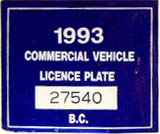 |
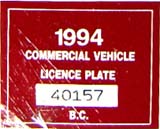 |
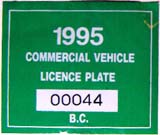 |
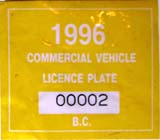 |
|
|
|
|
|
|
|
|
|
|
|
|
|
|
2011 |
2012 |
2013 |
2014 |
2015 |
2016 |
2017 |
2018 |
2019 |
|
|
|
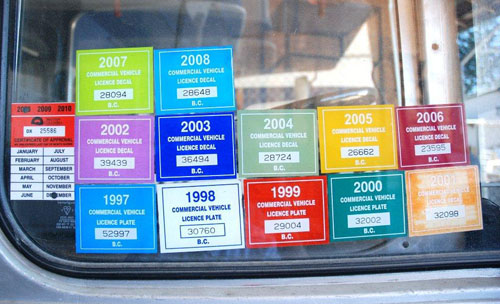 |
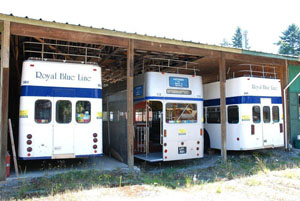 |
| These particular municipal decals (shown at left) were attached to a British double decker bus operated by Royal Blue Line of Victoria. The bus is now one of about a dozen a kept at a boneyard north of the city (shown above). |
| The End of the Program - 2019 |
On August 21, 2019, the Union of British Columbia Municipalities (UBCM) announced that the Commercial Vehicle Licensing Program would be ending on December 31, 2019. |
UBCM had undertaken a review of the program and determined that it had ceased to fulfill its original intent and that it was distributing funds disproportionately among local governments. More specifically; |
- the revenue generated was insufficient to meet program intent when disbursed among the participants;
- the program required significant resources to administer and was not enforced in many jurisdictions; and
- the program design distributed funds in disproportion to the actual commercial vehicle licensing that is occurring in communities.
|
The organisation had undertaken a review of the program and determined that it had ceased to fulfill its original intent and that it was distributing funds disproportionately among local governments. |
While we here at BCpl8s.ca agree with all of these conclusions, the approach taken by the province in winding down the program would seem to set the table for a return to the "jungle" of local government licensing requirements that existed prior to 1962. |
This is because there does not appear to be anything in the revised legislation prohibiting local governments from re-establishing their pre-1963 commercial vehicle licensing regimes. |
Not surprisingly, the major cities such as Vancouver and Victoria were quick off the mark to amend their bylaws to introduce replacement requirements (not surprising as they have maintained their own licencing requirements for taxis), with the the latter proposing to increase the cost from $25-40/year to $100-300/year: |
The Victoria Chamber of Commerce commented on the implications of the UBCM decision, noting that commercial vehicles operators in the Greater Victoria area could incur additional costs of $40,000 not to mention a windshield cluttered with decals if they are required to take out permits in every municipality in which they operated. |
|
As of October of 2020, it also appears that Oak Bay and Nelson have also implemented their own decal programs. |
Others, such as Prince George, determined that it would be "cost prohibitive for the [City] to establish and administer a similar program for these uses" and did not try to re-create the CVLD. |
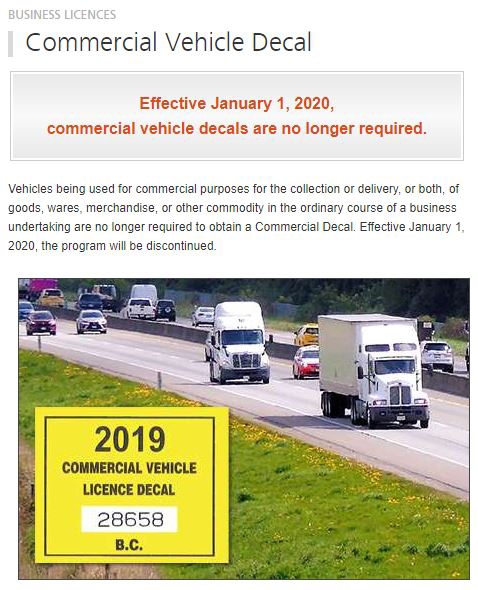 |
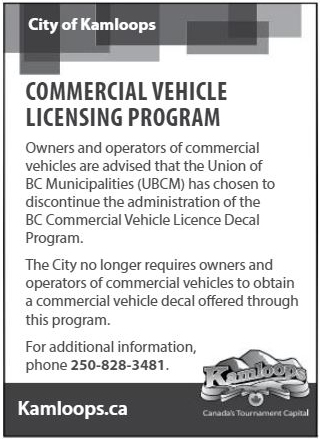 |
| Shown above (Kamloops) and at left (Richmond) are some annoucements by local governments advising that participation in the CVLD program would no longer be required after December 31, 2019. |
|
Sources
Statutes of British Columbia
Union of British Columbia Municipalities (UBCM) |

© Copyright Christopher John
Garrish. All rights reserved.
|